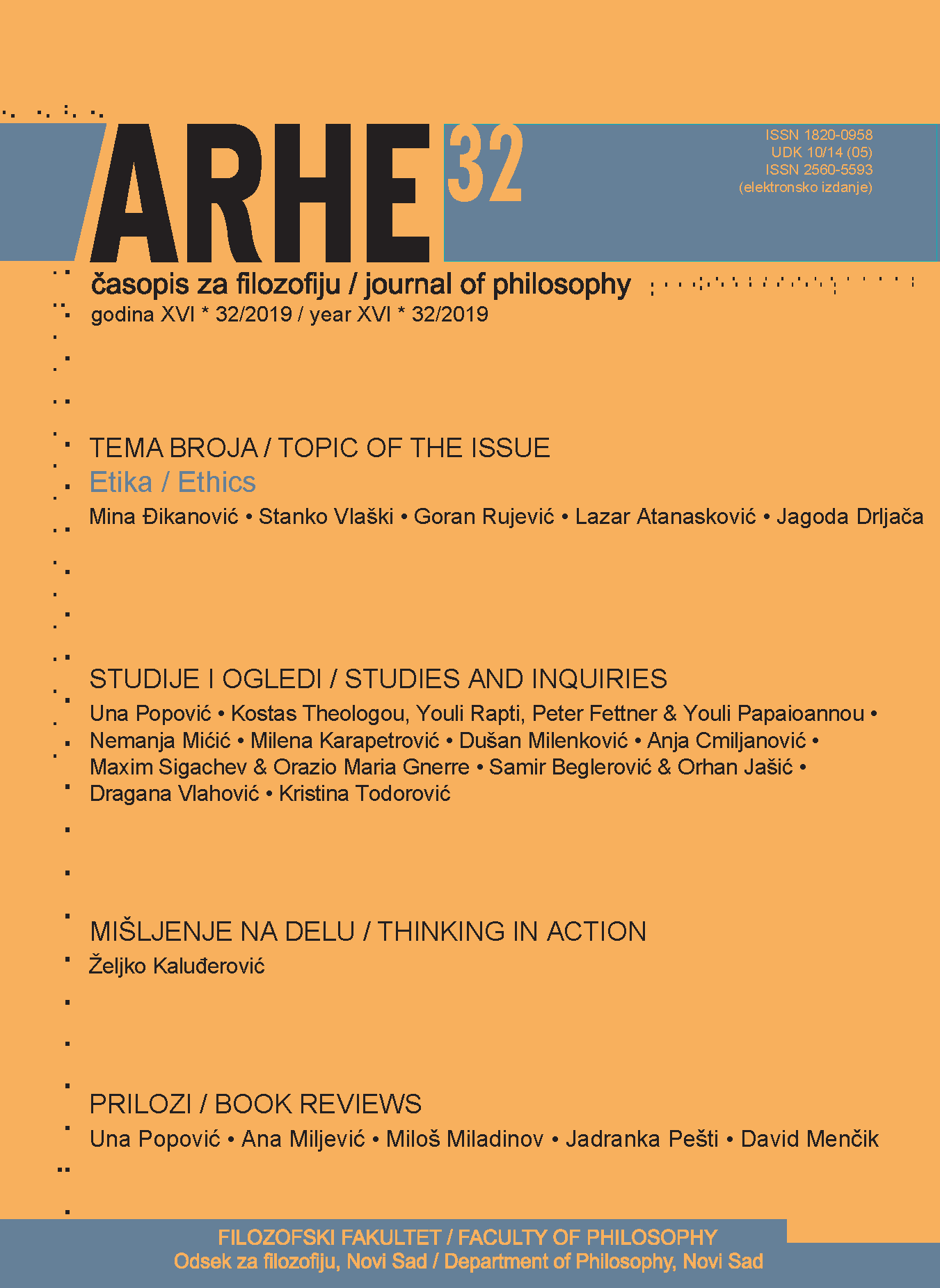HOW KANT AND HEGEL PRECLUDED LAW ON HEALTHCARE PROTECTION (LAW ON THE ORIGINAL SIN)
Main Article Content
Abstract
Apart from explication of the Kant’s and Hegel’s interpretation of the original sin, according to which this problem has the role of cultural, intellectual emancipation and progressive event, this paper explains completely different meaning of this problem as well. Using the right on scientific and research methodology work and such relation with the primary source – that is by the use of the wider contextual comparative analysis of it, the author in this paper comes to conclusion that the original sin represents deviation of the sexual intercourse (man and woman) and primary cause of severe diseases, transmitted in a numerous ways. With the stated taken into consideration, biblically described God’s opposition to this human offence would be law on healthcare protection, not denial of human freedom, maturation, independence and development of culture, intellect, subjectivity and self-consciousness, as thought by Kant and Hegel. Their interpretation of the original sin are, from that aspect, perceived as inhuman projects of preclusion of such law. As opposed to that, the aim of this paper is provision of human contribution, indicated in specific identification of primary cause of severe diseases, therefore indicating possibilities of their elimination, followed by disappearance of their consequences as well.
Article Details
References
Nikomahova Etika, Izdavačka knjižarnica Zorana Stojanovića, Novi Sad, 2013.
Atli, Bob, Kako je sve počelo: Postanje 1 – 11, Bible Lesson International, Maršal u Teksasu 2011, www.freebiblecommentary.org/pdf/srb/ VOL1AOT_serbian.pdf (preuzeto: 20. 4. 2019.)
Beti, Emilio, Hermeneutika kao opšta metoda duhovnih nauka, Književna zajednica Novog Sada, Novi Sad, 1988.
Biblija, Kršćanska sadašnjost, Zagreb, 1976.
Biblija, prevod: Đuro Daničić i Vuk Karadžić,
https:/dobravijest.files.wordpress.com/2011/11biblija-rdk.pdf (preuzeto. 20. 4. 2019.)
Diels, Herman, Predsokratovci, Naprijed, Zagreb, 1983.
Đorđević, Momčilo, „Put prema besmrtnosti“, u: Večernje Novosti, 2005.
Frojd, Sigmund, O seksualnoj teoriji - Totem i tabu, Izdavačko preduzeće Matice srpske Novi Sad, Novi Sad, 1969.
Hegel, G. W. F., Filozofija Povijesti, Kultura, Zagreb, 1951.
Istorija filozofije, BIGZ, Beograd, 1975.
Rani spisi, Veselin Masleša, Sarajevo, 1982.
Kelmajer, Mihael i Lisman, Konard Paul, Ko ti reče da si go, Adame, Laguna, Beograd, 2018.
Levinas, Emanuel, Totalitet i beskonačnost, Jasen, Beograd, 2006.
Vrijeme i drugo, Oktoih, Podgorica, 1997.
Među nama, Izdavačka knjižarnica Zorana Stojanovića, Novi Sad, 1998.
Perović, Drago, Kant i Njegoš: Mora li čovjek bit čovjek, u: Luča 1/2, Društvo filozofa Crne Gore i Studijski program za filosofiju Filozofskog fakulteta Nikšić, (2013).
Izlazak iz samoskrivljene nezrelosti: Kant i Levinas, u: Filozofska istraživanja, Vol. 37 No. 4, 2017, https://hrcak.srce.hr/index.php? show=toc&id_broj=16056 (preuzeto: 20. 4. 2019).
Platon, Timej, Eidos, Vrnjačka Banja, 1995.
Država, BIGZ, Beograd, 1976.
Gozba, BIGZ, Beograd, 1994.
Zakoni, BIGZ, Beograd, 1990.
Kratil, forum.ni.ac.rs/index.php?topoc=76.0 (preuzeto: 20. 4. 2019.)
Šijaković, Bogoljub, (Mithos, physis, psyche), Jasen, Beograd – Nikšić, 2002.
Stefanović, Milena, Feministička kritika Hegelovog poimanja žene, u: Arhe VI, 11/2009 UDK 141.71; DOI/:https://doi.org/10.19090/ arhe.2009.11.%25p. (preuzeto: 20. 4. 2019.)
Vujaklija, Milan, Leksikon stranih reči i izraza, Prosveta, Beograd, 1972.
Zizjulas, Jovan, Od maske do ličnosti, http://bogoslovlje.pbf.rs/ index.php/arhiva/156-1985/bogoslovlje-1985/913-od-maske-do-licnosti
Žunjić, Slobodan, Fragmenti Elejaca: (Parmenid, Zenon, Melis), BIGZ, Beograd, 1984.
